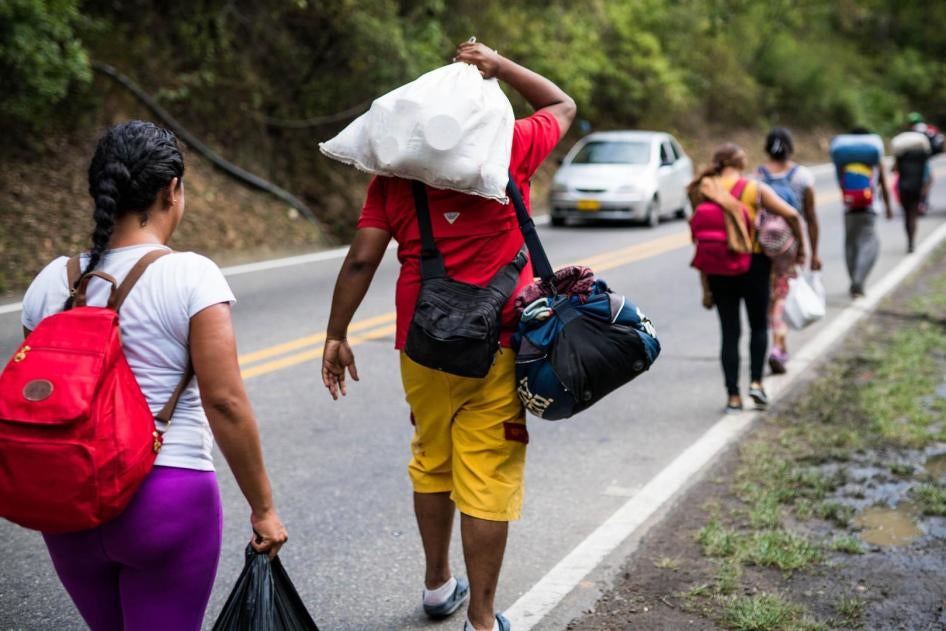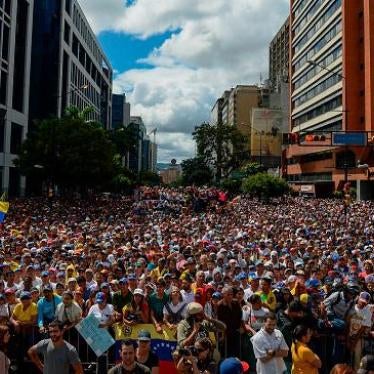(Washington, DC) – The United States Department of Homeland Security should designate Venezuelans for Temporary Protected Status because deteriorating conditions make it unsafe at this time to force people to go back there, Human Rights Watch said today.
The massive exodus of people from Venezuela is caused largely by a humanitarian crisis marked by severe shortages of medicine and food. Many Venezuelans have also fled because of a ruthless government crackdown that has led to thousands of arbitrary arrests, prosecutions of hundreds of civilians by military courts, and torture and other abuses of detainees.
“The humanitarian crisis in Venezuela is a classic case of the need for blanket temporary protection,” said Bill Frelick, refugee rights director at Human Rights Watch. “This is not the time to be deporting Venezuelans.”
Companion bills have been introduced in the House and Senate that would designate Venezuelans for Temporary Protected Status for 18 months. Both bills say, “Venezuela is enduring an unprecedented economic, humanitarian, security, and refugee crisis, consisting of extreme food and medicine shortages, severe infant and child malnutrition, rampant crime, and government-sponsored repression.” In addition, on March 7, 2019, Senators Richard J. Durbin (D-Ill.) and Marco Rubio (R-Fla.) led a bipartisan letter with 24 co-signers calling on President Donald Trump to designate Venezuela for Temporary Protected Status.
The responsibility for the humanitarian crisis, which has deepened since 2017, lies largely with Venezuelan authorities, Human Rights Watch said. During Nicolás Maduro’s presidency, the government has failed to address the crisis while making heavy-handed efforts to deny and conceal its severity.
More than 3.4 million Venezuelans have fled their country in recent years, according to the United Nations. The vast majority – 2.7 million – are in Latin America or the Caribbean. But as of June 2018, more than 72,000 Venezuelan asylum seekers were in the US. The Venezuelan American National Bar Association estimates that there are about 150,000 Venezuelan nationals in the US who would qualify for Temporary Protected Status.
Temporary Protected Status is intended to protect nationals and habitual residents of countries experiencing extraordinary and temporary conditions from being returned to those countries if they are not able to return in safety. Unlike asylum, which is intended to provide permanent protection, Temporary Protected Status does not require a person to qualify for or to seek refugee or asylee status based on a well-founded fear of being persecuted. Instead it considers generalized conditions that violate human rights as the basis for protection.
Venezuela is facing a severe humanitarian crisis. Human Rights Watch research shows that its health system is in utter collapse, with increased levels of maternal and infant mortality; the spread of vaccine preventable diseases, such as measles and diphtheria; and dramatic surges in infectious diseases such as malaria and tuberculosis. Although Venezuelan authorities have stopped publishing official data on nutrition years ago, research by Venezuelan organizations and universities document high levels of food insecurity and child malnutrition.
In the last quarter for which statistics are available (July – September 2018), Venezuelans were the leading nationality seeking asylum in the US. The 6,763 Venezuelan asylum applicants were 30 percent of all asylum applications in the US during that three-month period in 2018.
Human Rights Watch has urged Venezuela’s neighbors to provide region-wide temporary protection that would grant all Venezuelans legal status for a fixed period, at least until decisions are issued on their individual claims for protection.
“Some Venezuelans will qualify for asylum based on a well-founded fear of being persecuted if returned,” Frelick said. “Temporary Protected Status is the best available way to offer protection for people who do not qualify as refugees or are not seeking asylum but who nevertheless should not be sent back to their country because of generally unsafe conditions there.”









